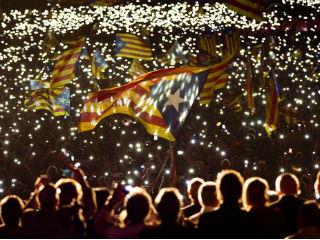With Spain and Catalonia still locked in confrontation, cool-headed mediators are desperately needed to take the heat out of the escalating Catalan crisis

Public grandstanding and high-profile interventions and declarations are not the only tools at the EU’s disposal. Policymakers, including MEPs should be seeking ways to engage in creative third-party mediation, which could include turning to trusted non-politicians, including non-Europeans, who can persuade Madrid and Barcelona to abandon confrontation in favour of dialogue and negotiation.
by
Shada Islam
The European Union and Spain’s European partners have been little more than concerned bystanders so far. They cannot stay out of the fray any longer. Madrid and Barcelona need urgent outside help to navigate the increasingly troubled political waters.
The Madrid-Barcelona standoff, Spain’s heavy-handed response to Catalonia’s independence referendum, and the EU’s failure to stop the slide into confrontation have dangerous repercussions for Spanish democracy, the EU’s standing with an already-jaded European public, and the future of other European separatist movements.
There’s more, however. What happens in Europe doesn’t stay in Europe. The explosive Catalan situation risks casting a dark shadow over the EU’s crisis-prevention and crisis-management capacities, thereby denting the EU’s global standing at a time when belligerent nationalisms, tough-guy politics, and hard-line winner-takes-all policies are becoming an unfortunate global norm.
With populism, public disaffection, and ethnic strife further straining an already tense global order, the EU has so far taken a strong stance against government crackdowns and state over-reaction to public protests in many parts of the world.
No two crises are the same. Still, the question must be asked: can the EU be seen as credible in defending human rights and preaching non-violent solutions to others if it is seen as impotent in dealing with such violations at home?
The question is especially important at a time when the United States, under President Donald Trump, is unable to stand up as a defender of fundamental freedoms. This leaves Europe in the spotlight, with many people across the world looking to the EU for help and support. It’s a responsibility that Europe cannot shirk.
The stakes are high, therefore making it imperative that the EU seek out new and innovative ways to defuse the Catalan crisis. While direct European intervention is ruled out, the EU has so far shown a striking lack of imagination in seeking alternate, less public, and less visibly intrusive paths to reduce Spanish-Catalan tensions.
Public grandstanding and high-profile interventions and declarations are not the only tools at the EU’s disposal. Policymakers, including MEPs should be seeking ways to engage in creative third-party mediation, which could include turning to trusted non-politicians, including non-Europeans, who can persuade Madrid and Barcelona to abandon confrontation in favour of dialogue and negotiation.
It won’t be easy. The Spanish government continues to reject any outside help. But recent public calls for dialogue and the Catalonian authorities’ willingness to accept mediation are encouraging.
Down the road, the EU should go one step further by making mediation a central plank of its response to dealing with seemingly intractable political challenges, whether inside Europe or outside.
In principle, mediation is already part of the EU’s on-the-ground preventive diplomacy and a component of the EU’s conflict prevention and peace-building toolbox for conflict countries. Last year’s EU Global Strategy makes a convincing case for the EU in preventing conflicts and engagement in pre-emptive peacebuilding and diplomacy, promising that Europe will redouble efforts on prevention, monitoring root causes such as human rights violations, inequality, pandemics, resource stress, climate change – which is a threat multiplier that catalyses water and food scarcity – and displacement.
It’s time to move from policy to practice. The continuing tragedy of violence and discrimination against the Rohingya population in Myanmar, the crisis in Yemen and Libya, and even the impasse over North Korea did not emerge out of the blue. Preventing further escalation demands that the international community move from official declarations of condemnation and remorse to a more pro-active and preventive role which takes account of early warning signals of conflict and confrontation.
This requires that the EU is more actively engaged in global mediation efforts, either by taking on the role itself or, when it cannot do so, by providing increased support to different European and international organisations - whether formal, informal, private or public - which have the expertise, experience, and know-how to do so.
Through its many public declarations, EU institutions are profligate commentators on world affairs. Such statements are an important indicator of Europe’s view of global politics. An equal amount of EU time should be spent on making sure that the unfortunate events which make such commentary necessary do not happen in the first place.
*Shada Islam is Director of Europe & Geopolitics at Friends of Europe
**First published in www.friendsofeurope.org

